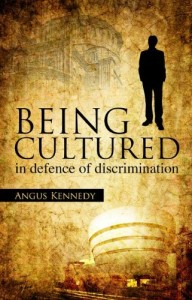
‘Being Cultured is a strongly argued and clear account of what culture is, why it matters and why it is now under threat. Angus Kennedy lays bare the connection between culture and discrimination, in ways that leave the cultural shibboleths of our time in ruins. This is a book that ought to be read by all students of the humanities as well as the politicians, bureaucrats and impresarios who are responsible for cultural policy and who seem to have lost all sense of why and how there could be such a thing or what would be achieved by it.’ Roger Scruton,Philosopher
Today culture is everywhere as maybe never before. We read culture reviews, watch culture shows, live in Cities of Culture, and witness the Cultural Olympiad. Government, museums and arts councils worry that we are not getting enough culture and shape policy around notions of art and culture for all. Access and inclusion are in. Difficulty and exclusivity are out.
In Being Cultured: In Defence of Discrimination Angus Kennedy asks if this explosion of culture, and the breaking down of distinctions between high and low culture, has emancipated us or left us adrift without cultural moorings. Is it true that all cultures are equal? Is cultural diversity a good thing? Is it unacceptably elitist to insist on the highest standards of judgment? To argue that some cultural works stand the test of time and some don’t? Can anyone dare to call themselves cultured anymore? Might it even be the case that culture no longer actually means anything much to us? That our nervousness about exercising discrimination and good taste – the erosion of cultural authority – might have left us with a culture that may be open to all, but lacking in depth?
This provocative book strikes a blow for discrimination in culture and argues that there is a responsibility on each of us as individuals to always be becoming more cultured beings: our best selves. Kennedy revisits the tradition – from Cicero to Kant, Arnold to Arendt – of autonomy in culture: both in the sense of its intrinsic value and how it rests on our individual freedom – quite apart from state and society – to discriminate and judge.
